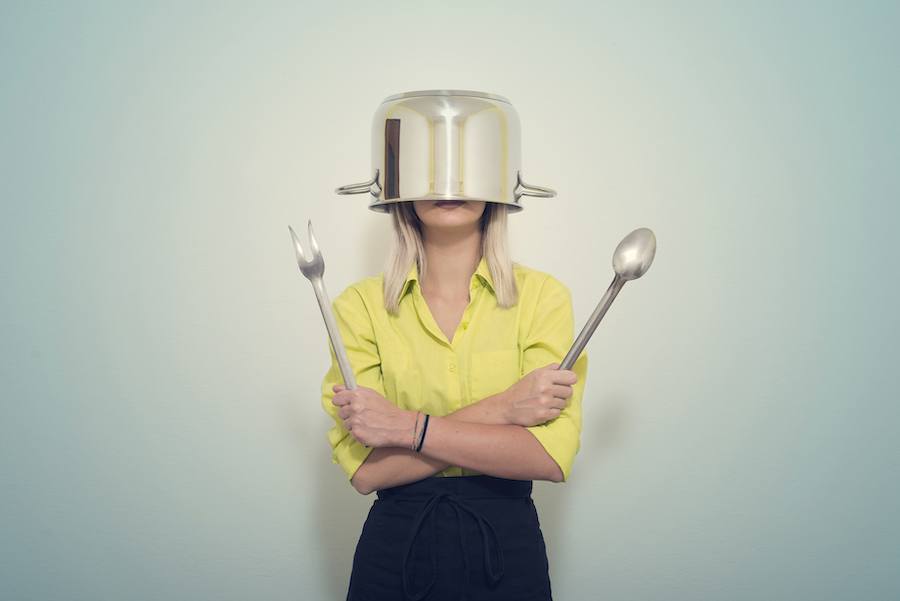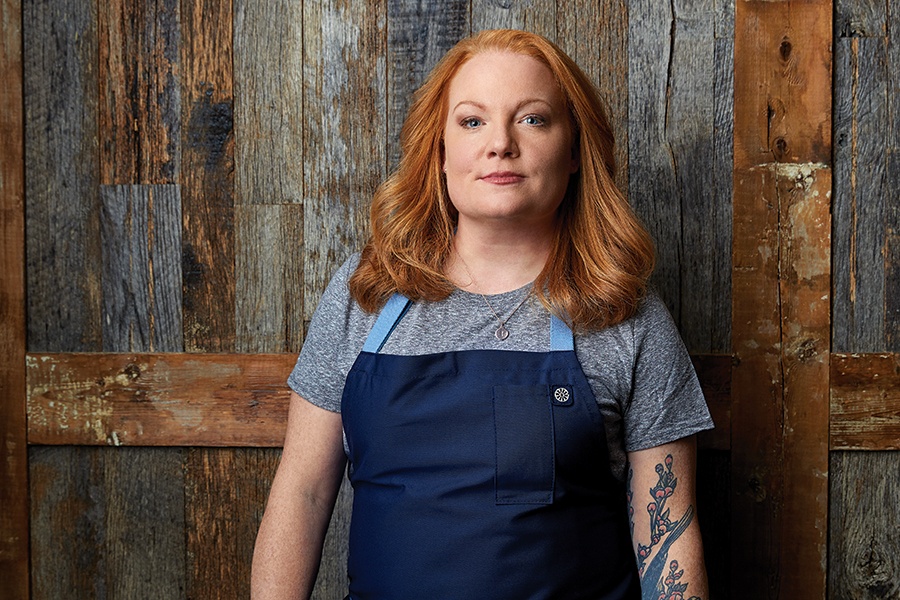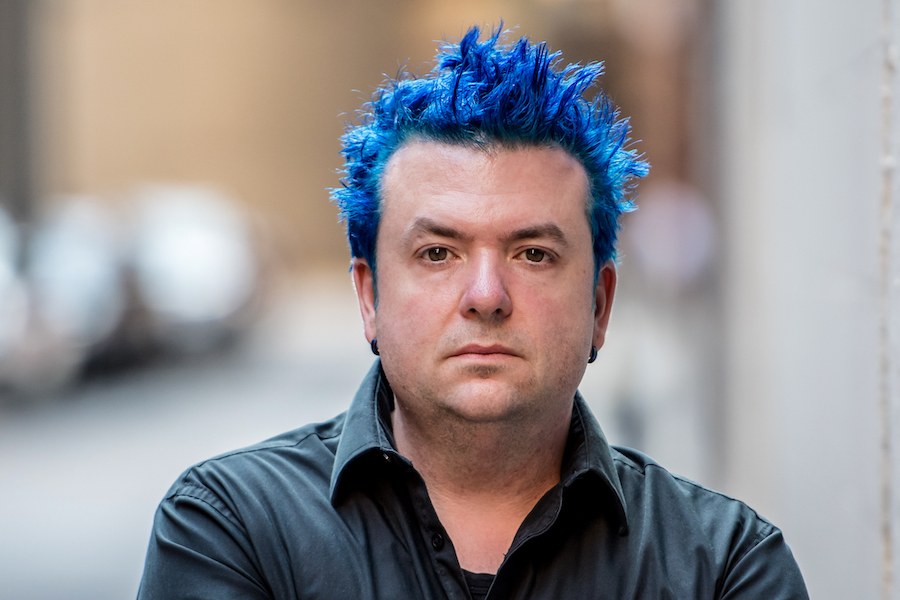How To: Home Cooking for Dummies in the Age of COVID
Finally learning how to use your kitchen? We tapped Boston chefs and restaurant pros for a 101-style crash course.

Flying blind in the kitchen? Allow our experts to allay all confusion. / Getty Photos
My first foray into quarantine cooking was going splendidly. With my Italian mother on speed dial, I set out to recreate her delectable Bolognese recipe, minus most of the accompaniments. In reality, I was just attempting to mix ground beef in tomato sauce, but I felt like I was on my way to culinary grandeur. After all, I had already poured myself a glass of wine. My forthcoming Instagram story practically wrote itself.
But then I encountered a debilitating dilemma: I had no idea how to operate a can opener. An entire adulthood of ordering takeout and scouring the Whole Foods hot bar did not prepare me to open up a can of tomato paste. In a panic, I rushed downstairs to my bedroom, where I furiously attempted to screw the opener onto the lid and twist. I could not risk any of my roommates seeing me in this compromising situation.
With restaurants closed in Boston since March 17 due to the coronavirus pandemic, many of us have been forced to get into the kitchen for the first time. It would be a daunting task in regular times, never mind today, when many of our anxieties are at an apex. Still, with the world on pause, there is no better opportunity to expand the culinary repertoire beyond cold-cut sandwiches and scrambled eggs. Self-care is more important now than ever, and let’s face it: you’re not going to receive the nutrients you need from frozen pizza or macaroni and cheese. On a quest to sharpen my skills, or at the least, cover the basics, I called upon four of Boston’s top chefs and restauranteurs for guidance. Here are the tips and tricks they told me I needed to know.

Chef Tiffani Faison’s biggest tip for home cooks? “Being patient with yourself.” / Photo by by Ken Richardson for “Tiffani Faison Has Nothing to Apologize For”
What are the biggest “must-knows” for complete cooking novices?
Tiffani Faison (Chef-owner, Tiger Mama, Sweet Cheeks, Fool’s Errand): Just be patient. We have time, and that time should include being patient with yourself. If you’re going by a recipe, read the recipe all the way through, take your time, and try to visualize where you’re trying to go and what it should be in the end—as opposed to reading the recipe and going step-by-step
Jason Santos (Chef-owner, Buttermilk & Bourbon, Abbey Lane, and Citrus & Salt): Seasoning is the biggest thing. When I see new cooks, they either don’t season, don’t season enough, or don’t realize when to season. Or, it’s old-school: they just put a salt and pepper shaker on a table. But that’s a big deal. Also: blanching vegetables ahead of time to sauté them, versus overcrowding a pan. That’s a big one—everyone just dumps everything into a pan and hopes for the best.
Joseph Leibowitz (Executive chef, Encore Boston Harbor): Understand what you like. Don’t try to overshoot the boundaries of something you may have seen on TV or read about. Stick to the basics that you feel comfortable in doing. Maybe it’s just boiling water for pasta, and then from that, you start going the route of, ‘OK, now that I can cook the pasta, what accompaniments do I need? What goes great with this?’ I think just being cognizant of what your capabilities are. You need to eat, you can only do so much, and you don’t want to hurt yourself in the process, or get yourself sick.
What’s the best way to build a shopping list and navigate the grocery store right now?
Kristie Weiss (Managing partner, Haley.Henry and Nathálie): When you go grocery shopping, know what you need to get there first. We’re trying to go once every 10 days, so we’re trying to decide what we need to eat now, and what we can prep or freeze for later. We kind of make a meal plan for the week. I think planning is the biggest thing.
Faison: Make yourself a menu for the week. Put your menu on a piece paper or whiteboard somewhere in your house. I would try and pick things for your menu that have ingredients that cross over. If you’re buying ground beef, you’re going to have it in two different forms. If you’re making meatloaf one day, make sure it’s a meatloaf sandwich the next day, so you’re effectively using all of your groceries and you’re not wasting. That’s a huge part of cooking at home, especially if you’re just cooking for one. It’s tough to cook for one sometimes. So really watch your portion sizes and the things you are buying. Think about using creative ways to not get sick of it. Nobody wants to eat the same thing four days in a row.

Joseph Leibowitz, executive chef at Encore Boston Harbor, doesn’t gamble on safety in the kitchen. / Photo courtesy of Encore Boston Harbor
How should we clean the kitchen and our groceries?
Leibowitz: We always have an empty bowl on the counter top. That’s basically the trash bowl. You see this a lot on cooking shows, but it actually helps greatly. You can kind of keep cleaning while you’re going, but you don’t have to walk all the way to the garbage pail and then come back and wash your hands in between. It’s something to make your process of cooking and prepping more efficient. You always want to have a good towel with you so you can wipe your cutting board off in between using different items. If you’re cutting an onion and broccoli, that’s fine, you can kind of wipe it. You also want to change out your cutting board if you’re dicing some beef. You definitely don’t want to use that same cutting board to chop up your onions. You really want to think through what you’re making, and make sure you have everything out that you need.
Weiss: My husband is pretty adamant when we come back from the grocery store, everything is wiped down—all of the boxes, all of the fruit. We’re cleaning everything before bringing it into the kitchen, so everything in the kitchen is ready to go. We also clean as we go along. I like to work in a clean space. I think it makes it easier. I feel more organized, so I can clean as I go along.
Faison: I wouldn’t worry about meat as much, because you’re cooking it anyway. So anything that’s touching or on the meat is going to get killed in the heat. I would be careful about anything that’s ready to eat that goes into your mouth. Personally, I’m washing everything with soap and warm water. I don’t really know what to say about herbs. You can’t wash them under warm water, and I refuse to not eat them, so I’m a little stuck on that one.

Chef Jason Santos says learning to sauté will save your home-cooking game. / Photo courtesy Jason Santos
What are some “must-know” techniques for new home cooks?
Santos: Sautéing means to cook quickly over a high amount of heat using a small amount of oil—making sure your pan is hot, making sure your oil is hot, and sautéing quickly at a high heat. If you’re just searing a piece of fish, it’s the same thing: a hot pan, searing the fish that’s seasoned. In theory, you can sear any piece of fish, or grill any piece of meat. Bring the meat to room temperature, season it, and grill it, and understand basically all meats will carry over one temperature once they rest. So if you cook a steak, cook it rare, let it rest, and it will carry over to medium-rare. I think a lot of people—if they want medium—they cook it to medium and pull it off the grill, but then it carries over and it’s overcooked.
Leibowitz: Braising. Putting a bunch of chicken thighs with a can of tomato sauce, a cup of olives, and some salt and pepper can really go a long way, and you don’t have to do too much besides putting everything in one pot. For the home cook, that translates to crockpot cooking. You can just put some basic ingredients together and stew it for about eight hours on the setting, and you would wind up having a great beef stew or braised chicken dish. I think that’s a really great process and technique for people who aren’t too comfortable using actual flame. For the little more advanced person, grilling is something that looks intimidating, but really isn’t—as long as you’re comfortable using the temperature thermometer.
Faison: We’re going to go back to high-heat and hard searing. If you are comfortable searing and cooking meat at high temperatures, you’re in good shape, and that transfers to a lot of things. It also just allows you to get more comfortable with heat in general. That’s part of the fear of cooking: people don’t want to hurt themselves.
What are some no-fuss meals that are still actually, well, meals?
Santos: Those slow cookers—or if you don’t have a slow-cooker, then a simmering pot. But I think a one-pot braised meat is a wonderful thing. People love braised meat: lamb shank, pot roast. People don’t realize the reason why it tastes so good is not so much because of the chef, but because you have a cut of meat that’s slightly more economical, and then you simmer it for a long time, and the protein comes out. So just braising something—I think something even as simple as beef stew. A professional can cook the beef, caramelize the vegetables, deglaze the wine. But honestly, if you just took it all and dumped it in a pot, it’s still not going to suck.
Weiss: Curries. For us, we always keep coconut milk and different curry paste in the house, so it’s easy to create a stew. You can use frozen vegetables—peas, corn. I think it’s super forgiving. I’m not a master curry maker by any means, but I think it tastes pretty good. Another dish we make a lot here, we make a coq au vin with chicken thighs, mushrooms and white wine. That’s pretty versatile, because we can eat it with potatoes, we can eat it with rice. It lasts for a long time. I then take the leftover chicken and we can do tacos with it. We’re following other chefs, too. David Chang is giving us great ideas. We’ve been regrowing scallions in water. You just put the stems in water near the window, we haven’t had to buy. We also make a huge batch of rice and then we freeze it and individually microwave it. That was his idea. It’s helpful.
Can cooking help maintain our spirits?
Leibowitz: For me, cooking is my zen area. I feel very comfortable. I’m almost in that fog and zone of relaxation. I do think for beginners, it’s probably more stress than comfort, so I think the key point to that is, the more you do it, the more this could become a zen release for you, or some comfortable outlet for you to just kind of enjoy what you’re doing. That’s really what cooking is about. You want to be able to have fun.
Faison: It’s just nourishing yourself and providing things your body physically needs. That’s really important. Then, in addition to that, I think just doing something and creating something out of your own hands is huge for your health. It’s great for your brain, it’s great for just general self-care and mental health. That’s why you see everybody baking right now. It’s not that we’re out of bread. No one is gluten free anymore, apparently. We’re not hearing from the gluten free crowd.

